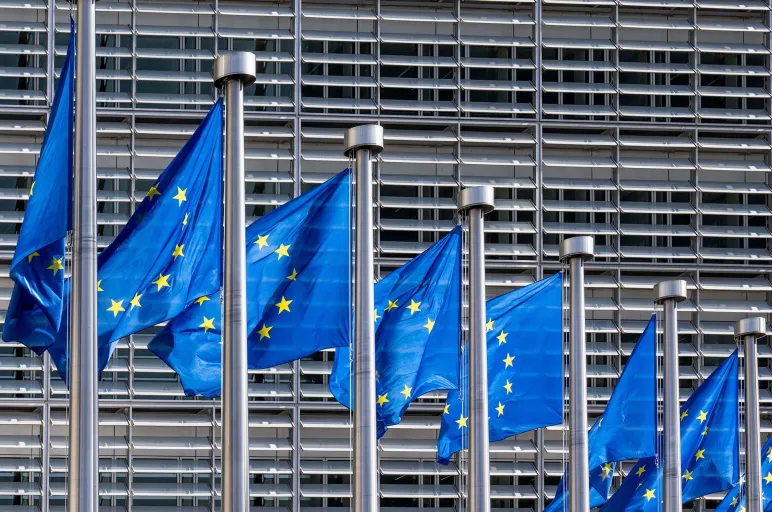
EU Delays CSRD Rollout — Why Now Is the Time to Prepare, Not Pause
- The delay eases near-term pressure on companies on sustainability reporting timelines.
- Organizations must still prepare systems, data, and processes for future ESG compliance.
- They should use this window to automate, validate, and improve supplier disclosures.
April 23, 2025 | Sustainability
The European Parliament, in a recent vote, has given its nod to the European Commission’s ‘stop-the-clock’ directive, delaying the implementation of sustainability reporting and due diligence regulations.
As many as 531 members of parliament voted in favor of the delay, as against 69 who opposed it .
The delay gives companies time until 2028 to comply with the Corporate Sustainability Reporting Directive (CSRD).
Earlier, in February this year, the European Commission introduced the Omnibus Proposal for amending the CSRD. This proposal aims to reduce the scope for smaller enterprises and streamline requirements for bigger companies.
Changes At a Glance
The European Commission’s omnibus package looks to increase the employee threshold for CSRD reporting companies to 1,000 employees.
This removes around 80% of companies from the scope of CSRD, emphasizing sustainability reporting obligations on the largest companies that are likely to have the biggest impact on the climate and the environment.
This also ensures that sustainability reporting requirements for large companies do not impact smaller companies in their value chains.
The proposed changes significantly reduce the reporting and compliance burden on companies, including a lesser number of data points required for sustainability reporting. They also limit the information that companies in-scope can ask for from companies with less than 1,000 employees. Further, they limit sustainability due diligence to the level of direct business partners.
The changes also include longer intervals between regular assessments, eliminating the need to periodically conduct in-depth assessments of their supply chains. Companies will be required to conduct due diligence beyond direct partners when they have plausible information suggesting that adverse impacts have arisen or may arise.
Is Simplification the Only Objective?
The quick approval of stop-the-clock proposal comes at a time when the U.S. President Donald Trump’s tariff plans have escalated global trade conflicts. Unusually high tariffs have sparked tensions in many regions, with leading Asian and European countries planning to implement counter measures.
Also, the EU’s sustainability laws haven’t gone well with the ruling party in the U.S., with Republicans considering the Corporate Sustainability Due Diligence Directive (CSDDD) as a non-tariff barrier for U.S. companies.
While the immediate objective of the delay may be to simplify complex reporting requirements, there could also be increasing debate about how to effectively implement these regulations without impacting core business operations.
What Should Companies Do?
The deadline for sustainability reporting has been extended.
But this does not mean that companies can stay off guard and take it easy for the time being. In fact, the deferred timelines aim to give companies more time to prepare and align with the requirements.
Companies must identify which aspects of their business and supply chain fall within the scope of reporting requirements. They should use this time to prepare and validate data sources, systems and processes in addition to finding data they are currently missing. This may sound complex, especially when many companies are currently struggling to capture and validate their suppliers’ data.
Nevertheless, companies must persist in their efforts and leverage advanced technology to simplify this process.
AI-powered technology can automate sustainability data collection, aggregation and analysis. It can also highlight processes, functions, as well as vendors that need close monitoring.
Leveraging the Right Technology and Tools
The primary challenge in sustainability reporting is to collect sustainability data from multiple sources across the supply chain. Companies therefore need a solution that automates data collection and validation. The solution should be user-friendly and feature guided workflows to cater to users with varying levels of technical expertise.
Advanced solutions also offer customizable reporting templates and seamless integration with ERP and CRM systems. Unlike a basic compliance solution, advanced platforms offer overall ESG management covering social and environmental criteria. Their scalable architecture ensures that businesses can expand their sustainability reporting over a period and demonstrate progress through enhanced transparency.
Further, as CSRD requirements are likely to evolve, companies need a solution with built-in updates and automated alerts on regulation changes. This will help maintain long-term compliance with sustainability regulations.
Need for External Support
Companies also need to partner with third parties to understand the disclosures applicable to their business, collate data and build systems.
Raghu Ekambaram, senior director of consulting at GEP, believes third-party support can help internal teams audit their current position and build required capabilities.
“If there are three topical standards that apply to your organization and you know where you stand, what target do you aim for – what the external market is doing, or what you can achieve? Third-party support on things such as a gap analysis will be useful,” he says in this GEP bulletin.
Overall, third parties can provide necessary guidance for companies and emerge as valuable partners in their sustainability reporting journey.
Talk to a GEP expert to simplify ESG tracking, cut Scope 3 emissions, and embed responsible sourcing into procurement.



